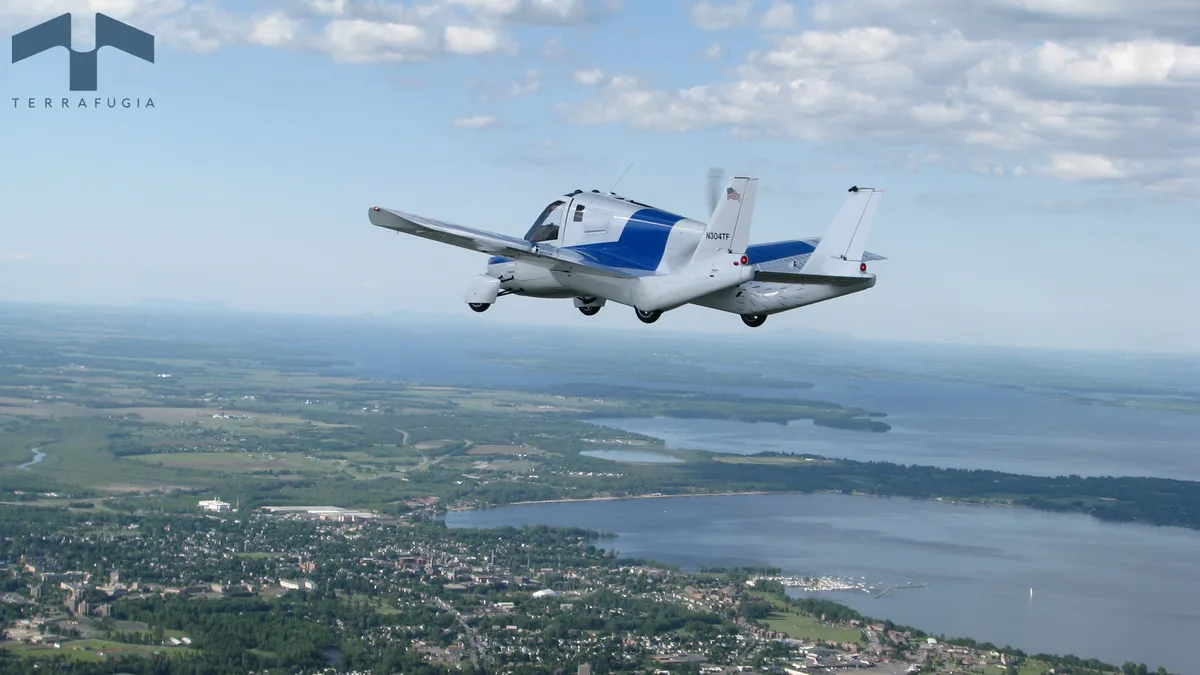Dive Brief:
- New Hampshire Gov. Chris Sununu, R, signed the nation’s first state law regulating flying cars late last month, in a move experts say could serve as a "stepping-stone" towards the technology becoming more widely available.
- The legislation formalizes the inspections, registration and fees processes around so-called "roadable vehicles" and allows them on public roads. The vehicles, which are under development, can be used on both the road and in the air and are seen by some in the industry as the forerunner to electric vertical take-off and landing vehicles (eVTOLs). Under manufacturers' plans, they would be driven to an airport, have their wings folded out, have a pre-flight inspection and then be flown.
- Even though flying cars are still some years off, creating a regulatory framework now helps lay the groundwork for when the technology is more mature, according to those involved in helping draft the legislation. "There's very, very few solutions out there that actually fit within any guidelines that exist today," said Mark Jennings Bates, vice president of North America sales at flying car firm PAL-V. "They're technologically challenged and they're regulatory challenged."
Dive Insight:
Flying cars have been the source of much excitement and hype in the smart city arena, but until now have not been regulated by a government at any level in the United States. This state-level bill changes that, and while industry experts have said that any kind of public-facing flying car may not be ready until next year at the earliest, having rules in place means they won’t be stymied.
"It's a lot better to have the legislation passed before you go to market, than try to go to market with something you can't operate legally on the road," said Kevin Colburn, vice president and general manager for flying car company Terrafugia.
An editorial in the New Hampshire Union Leader acknowledged there is still a lot of uncertainty around the technology, but said the legislation is a positive step for the state to take. "It remains to be seen if the space aged futurists' visions of highways in the sky (or personal jetpacks) will ever come to pass, but it is nice to see New Hampshire at the forefront," the editorial reads.
In the absence of any federal regulations, Colburn said he is hopeful New Hampshire’s new guidelines could set a standard for other states to follow as they look to put together their own laws on flying cars in the coming years.
"Having a carefully thought-through process in New Hampshire, other states will also look at that and say, 'Yes, they did a nice job, it's very thoughtful, that could work for us,' instead of putting a lot of energy and resources into figuring out on their own, 'let's adopt their language or something substantially similar,'" Colburn said.
Terrafugia and PAL-V collaborated with a third company, Samson Sky, on pushing for the legislation. PAL-V has its US headquarters in New Hampshire, while Terrafugia is testing its roadable aircraft at Nashua International Airport in the state. Keith Ammon, a former New Hampshire State Representative who is now a dealer with PAL-V, said while eVTOLs are exciting, there is a long way to go and these laws are a next step.
"If you want to be forward-looking, a decade or two from now, roadable aircraft are a step along a continuum," Ammon said. "The technology isn't quite there yet to have autonomous, people-sized drones be a practical solution for cities, then there's also a lot of regulatory hurdles around being able to operate something like that as a business. You can look at roadable aircraft as a stepping-stone towards more futuristic mobility solutions that would definitely impact cities."












